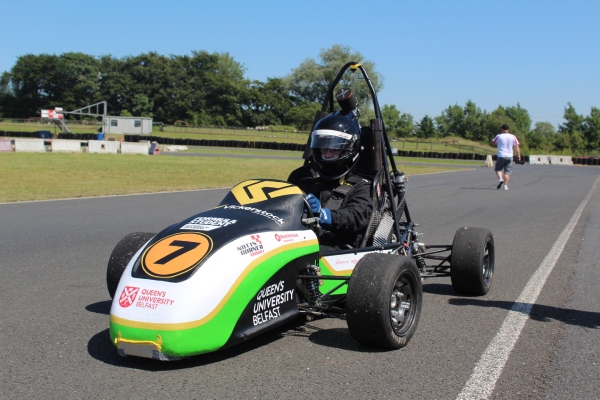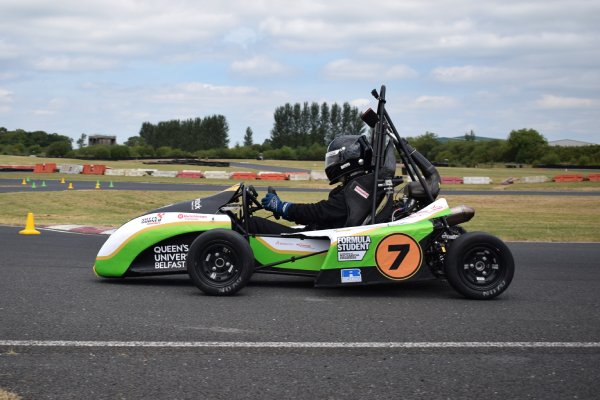Kindly give us an overview of your university and team!
Peter Gillan (PG): We are Queen’s University Belfast and we’re a team of 31 undergraduate students with diverse backgrounds and a wide range of expertise. The team members come from mechanical, electrical, aerospace and product design engineering, and from 1st year to 4th year. We’re based in the School of Mechanical and Aerospace Engineering but work closely with our colleagues in Electrical Engineering.
How has COVID been affecting the team and how have you been overcoming any related issues?
PG: COVID has changed a lot about how we approach the design process. There has been lots of Microsoft Teams meetings!
We’ve been able to discover new channels of communication and have put an increased emphasis on using collaborative tools to work together. Despite the challenges, COVID has allowed the team to grow a lot through exploring new methods of work.
The most noticeable area where COVID has affected the team is in the build process. It has been a challenge to work on the car when only one person is allowed near it at a time. Fortunately, we have a great support team who have been able to step-in and support us with all practical queries.
Tell us about the vehicle/s you’re developing for FS2021!
PG: We’re currently developing our first electric vehicle, a massive transition for the team. We’ve opted for a single-motor RWD set-up to develop the foundations required for an EV. Thankfully, we’ve been preparing for this move over the past couple of years, with different students completing their dissertations on electric powertrain design. It’s exciting to see it all come together and produce a running vehicle.

What are your goals for the upcoming competition?
PG: For our first year with the electric powertrain, our primary goal is to get past scrutineering and get invaluable feedback from the judges. Beyond this, data collection and experience will go a long way in improving the QFR car for future years to come. It’s been a steep learning curve and we’ve had to really push out of our comfort zones to build the new powertrain. We hope we can build a strong foundation for future teams to iterate on, getting faster, lighter and stronger each year.
What’s been your best moment of the competition so far?
PG: Interacting with other teams at the competition has been fantastic. We’ve really enjoyed being able to talk to other teams, particularly when relaxing in the evenings. We’ve learnt a lot from their experiences and understanding how they’ve approached their build process.
How have you been collaborating with other teams, either in Ireland or worldwide?
We’ve been involved with the other local teams since starting Formula Student and have worked well with Ulster, University College Dublin, and Dublin Institute of Technology over the years. We’ve also following along closely with other teams’ social media pages and have learned a lot from teams that have already made the transition to an electric powertrain. The collaborative nature of the competition has really helped us, with teams readily sharing information on how they approached the design-process. Formula student forums have provided a great opportunity to collaborate and have discussions with other teams worldwide.

What made you and/or some of your team members join Formula Student?
PG: A lot of us have joined Formula Student for the opportunity to use our engineering skills in a practical environment. It’s really exciting to apply theory and produce a physical car. Speaking personally, I think that most of my engineering growth has come through Formula Student projects. The car always challenges us to produce our best work and I think this has encouraged a lot of younger students to join up.
What would you say to anyone just starting FS for the first time this year?
PG: Don’t be afraid to try out lots of different tasks! Formula Student provides great opportunities to try out jobs outside of your area of academic expertise. I remember feeling out of my depth as a first-year student when helping design the carbon fibre tub. You quickly learn that a positive attitude and enthusiasm will get you through any task.
Get out of your comfort zone, work hard, and have fun!
What do you think QFR in particular bring to the competition?
PG: I think QFR brings a really strong team spirit. For some team members, this is their fourth year working together on the car. Great friendship groups have formed, and teams work effectively together. Younger students have really benefited from this set-up, forming friendships with final-year students who can offer their expertise. For me personally, this has greatly benefited my academic career. The team spirit is definitely something that QFR is proud of.
Who or what inspires you and the team?
PG: That really depends on who you ask in the team! I asked a few team members, and two common names stood out: Christian Horner and Toto Wolff.
We can recognise a real commitment to success from both names. It has been inspiring to see their battle and pursuit of excellence over the years. We want to take the same competitive spirit and channel it through our workflow, helping us build the best car we possibly can.

Who in the team deserves some recognition for their work?
PG: We’d love to be able to thanks our extra-curricular team. They are always keen to get involved in different tasks. When it comes time to build the car, it’s often our extra-curricular team members do the random tasks everyone else has forgotten about. The enthusiasm they bring to the team really motivates us all.
Their addition to the team also builds strong foundations early on in their academic career, leading to a vast knowledge range when in their final years contributing to QFR which can only ever be a good thing!
Anyone you would like to thank?
PG: We’d like to thank Dr Geoff Cunningham for all his work with Formula Student over the years. The technical staff have also been a constant source of support for the past 21 years. Alongside that, there are many members of the faculty at Queen’s who have provided practical help over the years and helped us reach where we are today.
We’d also like to thank our sponsors. We’ve had lots of support over the years from many companies and we’ve enjoyed growing together. The primary sponsors we would like to thank are McCloskey International, Vickerstock, Hutchinson Engineering, IPG, Ricardo and Nutt’s Corner.
Thanks so much to Peter and team for taking the time to share their updates and best of luck to the team for the Summer competition.
In the meantime, be sure to follow Queen's Formula racing on their website as well as on their social media channels to catch up on their build..
Twitter: Queen's Formula Racing
Facebook: Queen's Formula Racing
Instagram: Queen's Formula Racing
Youtube: Queen's Formula Racing